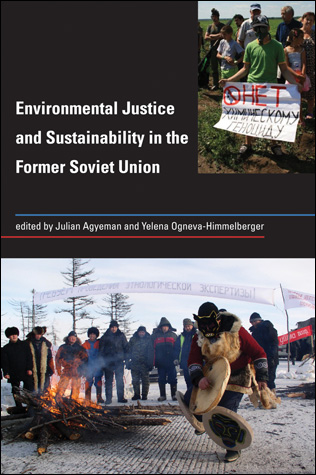Environmental Justice and Sustainability in the Former Soviet Union
 Published by: The MIT Press
Published by: The MIT PressRelease Date: May 15, 2009
Pages: 312
ISBN13: 978-0262512336
Buy the Book: Amazon, Barnes & Noble, IndieBound, The MIT Press, Apple Books
Overview
The legacy of environmental catastrophe in the states of the former Soviet Union includes desertification, pollution, and the toxic aftermath of industrial accidents, the most notorious of which was the Chernobyl disaster of 1986. This book examines the development of environmental activism in Russia and the former Soviet republics in response to these problems and its effect on policy and planning.
It also shows that because of increasing economic, ethnic, and social inequality in the former Soviet states, debates over environmental justice are beginning to come to the fore. The book explores the varying environmental, social, political, and economic circumstances of these countries—which range from the Western-style democracies of the Baltic states to the totalitarian regimes of Central Asia—and how they affect the ecological, environmental, and public health.
Reviews
“In the quest for a middle ground of `Just Sustainability,’ fresh insight is provided by this eclectic portrait of a region where both justice and sustainability are in short supply.”
—Michael R. Edelstein, Ramapo College of New Jersey, author of Contaminated Communities, and lead editor of Cultures of Contamination
“With in-depth field surveys, rich historical contextualization, and cultural assessments this book shines a light on issues that have received little attention in western publications. Citizens of the Former Soviet Union give voice to environmental issues and their interrelation to ethnic conflicts, nationalism, criminality, and other issues. This book convincingly shows how environmental issues and their solutions are critically tied to other factors.”
—Walter Richmond, German, Russian, and Classical Studies, Occidental College
“Environmental Justice and Sustainability in the Former Soviet Union (FSU) is a timely, well-written analysis that sheds light on issues too often ignored. The compilation illustrates that justice concerns across the FSU are as varied as the many cultures and unique environmental conditions found on a continent spanning half the Northern Hemisphere….An excellent group of contributing authors provide examples from the Russian Far East, Central Asia, and the Baltic States, and span a host of environmental problems. Summing Up: Recommended. Upper-division undergraduate through professional collections”
—D. Ostergren Choice
“Environmental Justice and Sustainability in the Former Soviet Union is a thoughtful study that delves into the complexity of this region with vigor and enthusiasm….From the macro economics of globalization to the micro village economies dependent on natural capital, the authors in this book weave a startling account of economic inequalities, political turmoil, and the direct connection between environment, politics, and demographics….The broad diversity of the volume results in a book that can appeal to a wide range of scholars, students, and activists. Those with an interest in environmental justice, sustainability, history, sociology, social movements, anthropology, politics, economics, or the development of the former Soviet Union will find this an intriguing book filled with disquieting empirical evidence and writers from a diverse array of disciplines and specializations.”
—Contemporary Sociology
“Political scientists, environmental studies specialists, and historians will find something of great interest in this volume. Anyone interested in contemporary environmental politics in the FSU should read this book. The introduction and the conclusion provide the framework for the case studies. Another strong point is a rich bibliography that accompanies each chapter.”
—Paul Josephson, Environmental Health Perspectives
“The book will excite scholars and activist interested in environmental justice, sustainability, environmental social science, and post-Soviet studies.”
—Peter C. Little, Electronic Green Journal